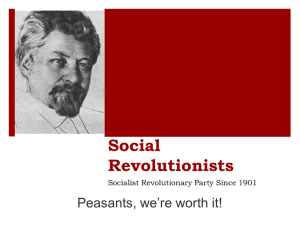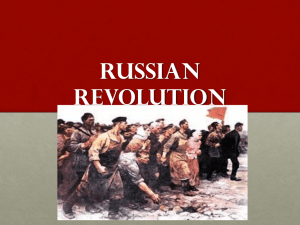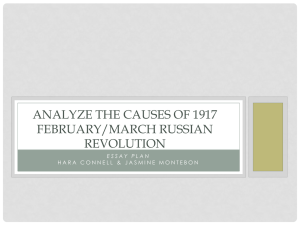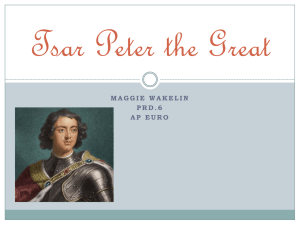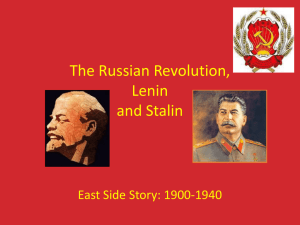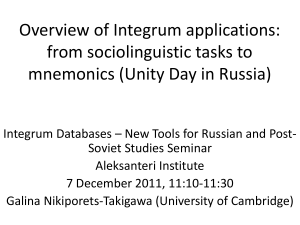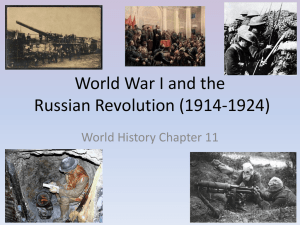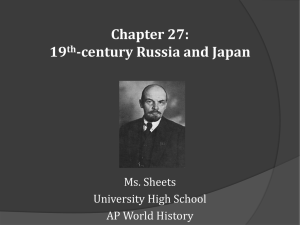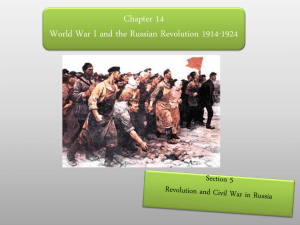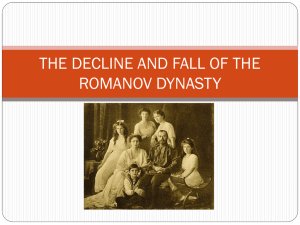World War I and the Russian Revolution
advertisement
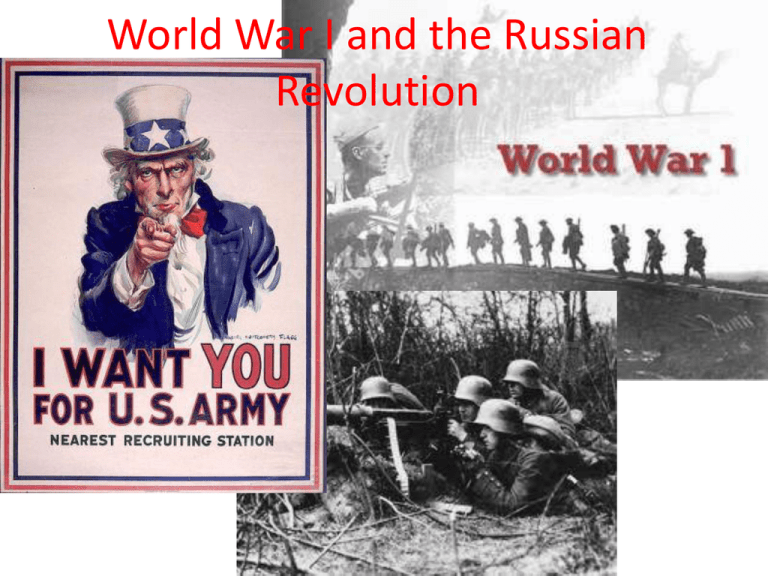
World War I and the Russian Revolution Before World War I • Europeans were enjoying greater peace • There hadn’t been a major war in Europe in almost a century • There was discontent in Turkey, Mexico, China, and Russia where some reformers were outraged at sharp social divisions and authoritarian governments • Formed revolutionary movements • Russia- 1905 Tsar was forced to create a national assembly • Turkey- overthrew the Sultan in 1908 • Mexico-overthrew the dictator in 1910 • China- overthrew the emperor in 1912 • Events in Austria-Hungary will bring the rest of Europe into armed conflict Underlying Causes of the War • Many factors prepared the way for the war. • Some believed conflict was inevitable • Few predicted the war would be as destructive as it was http://ww w.youtub e.com/wa tch?v=kfx rTD-kPps Militarism • Military values and goals take over civilian society • European countries were building up their armies • Because it took time to assemble and move armies, leaders thought it was best to attack first • This created pressure to mobilize and act quickly Alliances • By 1914 Europe was divided into two main alliances. • Triple Alliance: Germany, AustriaHungary, Italy • Triple Entente: Russia, France, Great Britain • Sought to preserve the balance of power, but one threat could drag everyone in Nationalism • Belief that each ethnic group should have its own nation and promote their nation’s interests • Encouraged rivalries between France, Germany, Austria-Hungary, and Russia. • Led to the creation of nations in the BalkansGreece, Serbia, Bulgaria, Albania, and Rumania • Some of these new countries were unstable • Austria-Hungary contained many ethnic groups that threatened to break it apart Imperialism • Competing claims for colonies created tension. • There were also competing economic interests • Germany threatened Britain • Russian interests threatened Austria-Hungary and Turkey Assassination • In July 1914, Archduke Ferdinand of AustriaHungary was assassinated by the Black Hand, a Slav nationalist group • Serbian officials helped the assassins • Austria-Hungary invaded Serbia • This set off a chain reaction • Because of the alliances Russia entered to protect Serbia • Germany entered to protect Austria • Britain and France came in to honor their alliance with Russia • Started off as a small crisis in the Balkans and turned into a major conflict Franz Ferdinand Assassination • http://www.youtube.com/watch?v=E6e8BW0l-E • http://www.youtube.com/watch?v=K_tNXFbx 0VY • http://www.youtube.com/watch?v=VC_26YX MZd4 US Helps • The US was neutral, but sympathetic to Britain and France, so they sent them supplies by boat. • The supply ships were attacked by German submarines. • UNRESTRICTED SUBMARINE WARFARE • The submarines sank the Lusitania, killing 1,198 passengers • Germany sent the Zimmerman telegram, asking Mexico to attack the US. http://www.youtube.co m/watch?v=sURi21sJsW c • US enters in 1917 to make the world safe for democracy • Pres. Wilson announced his Fourteen Points http://www.youtube.com/watch?v =ZVDUXPB_sTs • • • • Redraw Europe freedom of seas end secret diplomacy Establish a League of Nations http://www.youtube.com/watch? v=53iKJS0Gi5c Alliances in 1917 Central Powers Germany Austria-Hungary Ottoman Empire VS. Allied Powers Russia Serbia France Britain US • America’s entry into the war broke the deadlock. • Nov. 1918 the Germans surrendered • http://www.youtube.com/watch?v=soFhWkxS ZAY Paris Peace Conference (1919) http://www.you tube.com/watch ?v=ShRA8HRMR 4Q • Germans overthrew the Kaiser • Wilson (US), David Lloyd George (Britain), and Georges Clemenceau (France) meet in Paris to negotiate peace. • Treaty of Versailles established peace • Germany lost territory • mandate system-Allies took all enemies colonies • Germany paid huge reparations (33 billion, just finished in 2010) • created the League of Nations • Was done in secret • Covenant of the League of Nations: – prevent warfare – no military – create Court of International Justice – US did not join http://www.youtube.c om/watch?v=TdHA5u T9ocg • Why would the US not want to join the League of Nations? • Why did the League of Nations fail? Armenian Massacre • Armenia was a part of the Ottoman Empire. • Empire was Muslim, Armenians remained Christians. • They were tolerated, but did not experience full equality under Islamic law. • Sultan encouraged Muslims to settle in Armenian land http://www.youtu be.com/watch?v=x NGqd7q76s4 Play till 1:30 Sultan Abdul Hamid II • Caused conflict • Sultan falsely charged the Armenians of rebelling • Muslims were allowed to attack the Armenians • next 2 years, 200,000 Armenians were killed Young Turks • In 1908, a group of young intellectuals over threw the sultan • This new leadership sought to make the Ottoman Empire exclusively Muslims. • In 1910, the Armenians were labeled enemies of Muslim Turkey (due to not fitting the above description) Genocide Begins • In 1914, Ottomans entered WWI. • Military offensive against Russia ended in disaster so accused the Armenians of aiding Russia. • In June 1915, the Armenian population was deported to the desserts of Syria and Iraq. • Were murdered, died of thirst and hunger, shot, buried in mass graves • Killed 1 million Armenians in death marches http:// www.y outub e.com /watch ?v=8W lN7BQ rrYg Start at 330 • In 1919, the Young Turks were put on trial and were found guilty for the destruction • The Allies wanted to take away the Turkish heartland • Ataturk fought back and got Turkey declared a secular state in 1920 • He released all prisoners Why do we know so little about this? • 1 million deaths is not a lot compared to millions lost in other countries. • Europe is in shambles, each country has its own issues to deal with. • The term “genocide” is created by Professor Raphael Lempkin in 1946, (after WWII ) and recognized at a United Nations convention in 1948. • Genocide, briefly, is the intent to destroy, in whole or part, ethnic or religious groups. • Turkey denies the massacre ever happened • http://www.youtube.com/watch?v=arH7PV8h HVg Armenian Genocide • Explain the position of the Turkish people after WWI • What motivates them to deny it happened? • What actions do they take to deny it happened? • 38-44 • http://www.youtube.com/watch?v=NSA1xngF f4s • Has the Turkish position changed? • What is done to people who talk about the Genocide today? • 46-49 • http://www.youtube.com/watch?v=NSA1xngF f4s • On the back of your WS answer this question in at least 5 sentences. • How does the Armenian Genocide and its denial contribute to how you answer the question “How can international recognition of the Armenian Genocide help prevent future crimes against humanity?” Christmas during WWI • http://www.youtube.com/watch?v=3J5IkxPp6 sM http://www.youtube.com/watch?v=hAA9Z VgZauA Fighting the war • New and improved weapons were used in fighting the war, including the machine gun, poison gas, submarines and airplanes • Soldiers dug deep trenches that extended for hundreds of miles • Trench warfare was a new and strange form of warfare the world had never seen. • In trench warfare, both sides dug ditches to created fortified positions. • Separated by fields of barbed wire and mines known as “no man’s land” • Fighting line became stationary • Often stood in water all day and had rats Poison Gas Airplanes Tanks Machine Guns Submarines (U-Boats) Trench Foot http://www.youtube.com/watch?v=_gO U_GCkwMo Trench Warfare Reenactment • Make a plan with your country to advance to the other trench • You may only throw paper balls, when hit you must “die” • You have 5 second to put your gas mask on when I yell “GAS!” or you must “die” • The atlas are landmines you may not step on • If “killed” in no man’s land, you must stay there • THERE WILL BE NO SOUND AT ALL!!!! Before the Russian Revolution • The Russian Tsars ruled as autocrats (absolute rulers) while the serfs were bound to the land • Tsar Alexander II emancipated the serfs in 1861 • He was assassinated and all other reforms were stopped. • Introduced Russification: forcing non-Russian people to adopt the Russian language and culture • Jews were persecuted in anti-semitic programs • Russia was very backwards. Peasants lived in terrible poverty while the rich lived in splendor • Russia was defeated in the Russo-Japanese War. • Troops shot at unarmed protestors on “Bloody Sunday” • In 1905 revolutions broke out and Tsar Nicholas II created an elected legislature known as the Duma Revolution of 1917 • In 1914, Nicholas II brought Russia into WWI • Troops were poorly equipped and food was short on the front and at home • In March, food riots broke out and the Tsar was replaced • Vladimir Lenin seized power with his Bolsheviks who promised “Peace, bread and land” • They changed their names to the Communists and Russia became the Union of Soviet Socialist Republics (USSR and Soviet Union for short) Under Lenin • They withdrew from the war, gave land to the peasants, and nationalized industry • War between the Reds (followers of Lenin) and the Whites (wanted the Tsars) • Lenin executed the Tsar’s family • The Reds won The Roots of Revolution • Russia was ruled by a Tsar with absolute power • Most Russians were poor serfs who were tied to the land • Russian nobles owned thousands of serfs and controlled vast amounts of wealth Russian peasants around 1910 How is this similar to Europe in the Middle Ages? Emancipation of Serfs • Russia fought a series of wars between 1854 and 1856 with the Ottoman Empire. Russia lost the Crimean War. • Tsar Alexander II tried to free the peasants in 1861 but was assassinated. Nothing changes, the peasants were still required to work the land and pay rent to the nobles. Tsar Alexander II Autocracy, Nationality, and Orthodoxy Russian rulers saw themselves as all powerful (autocrat) Russian Orthodox Church Russian rulers saw themselves as the protectors of the new Slav states in the Balkans Policy of Russification: forcing on-Russians such as Finns, Poles, and people of Central Asia to adopt the Russian language and culture. The Jewish people were persecuted in anti-semitic programs Prelude to Revolution Explain the • Russia was a cartoon. (Start backward country in reading at the bottom) 1900. • Peasant and factory workers lived in poverty. • Nobles lived a wealthy life of leisure. • Tsars opposed democratic ideas and social reform. The Revolution of 1905 • Russia lost the RussoJapanese War (1904-1905) • “Bloody Sunday”: unarmed demonstrators were trampled by the Tsar’s troops in St. Petersburg. • Revolution broke out, peasants seized land, city workers engaged in demonstrations and strikes. • Tsar Nicholas II enacted limited reform, created the Duma (legislature). Only the very wealthy could vote for members of the Duma. What problems do you see with the Duma? The Russian Revolution of 1917 • World War I: The poorly trained and equipped Russian army suffered many defeats. • “February Revolution” (March 1917) – Worker led food riots broke out in Russia – Tsar Nicholas gave up the throne and the Duma declared Russia a republic – New government failed to win the support of the people The “October Revolution” (November 1917) • Vladimir Lenin, a Marxist exiled to Switzerland, was sent to Russia by the Germans to stir up trouble during WWI. • Lenin and his supporters, Bolsheviks, promised peace, bread, and land. Peace to soldiers, bread to workers, and land to peasants. • The Bolsheviks led another revolution at the end of 1917 and took over the government and called themselves the Communist Party. Russia became the Union of Soviet Socialist Republics (USSR) The Soviet Union under Lenin (19171924) • The Russian Civil War (1919-1921) – Lenin’s followers (Reds) vs. Tsar supporters (Whites) – US and other countries sent help to support the Whites – Reds got support from workers and peasants – Lenin executed the Tsar and his entire family – Reds defeated the Whites • Lenin’s New Economic Policy – Private ownership was allowed in small-scale manufacturing and farming – Most farms and industry was owned by the government – Production was slowly increased – Lenin died in 1924 and Joseph Stalin took over Economic Policy • Economy was in shambles • Had to temporarily put aside communist policies to avoid disaster. • NEP (New Economic Policy): allow some private ownership • Seemed to be working, but Lenin died • Joseph Stalin took over

